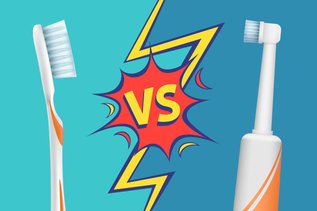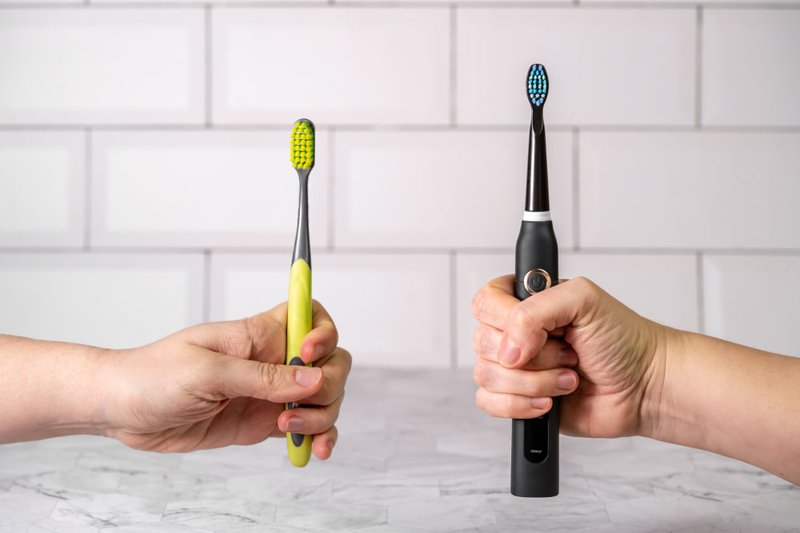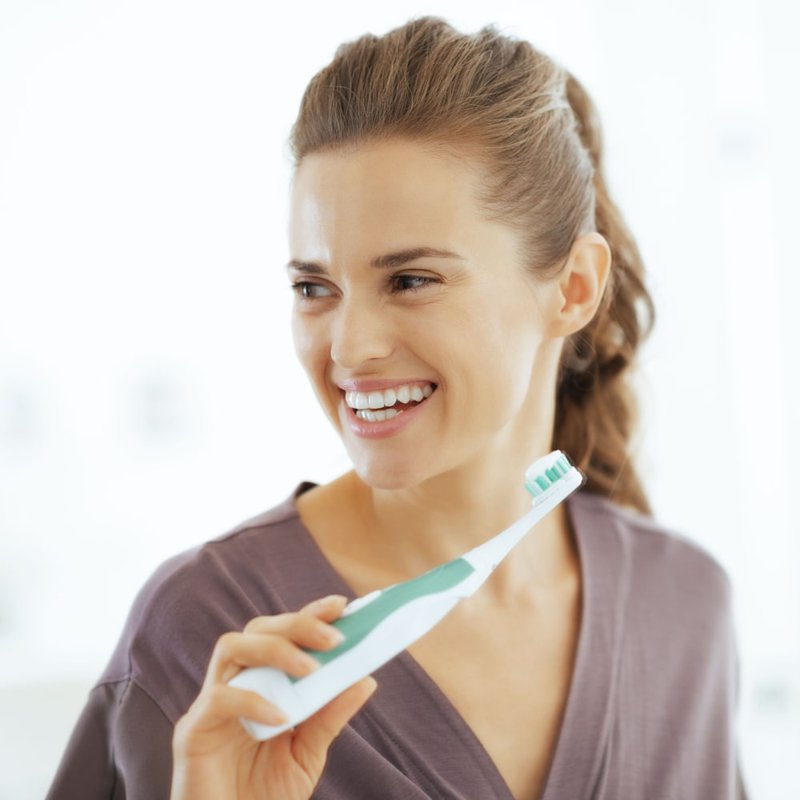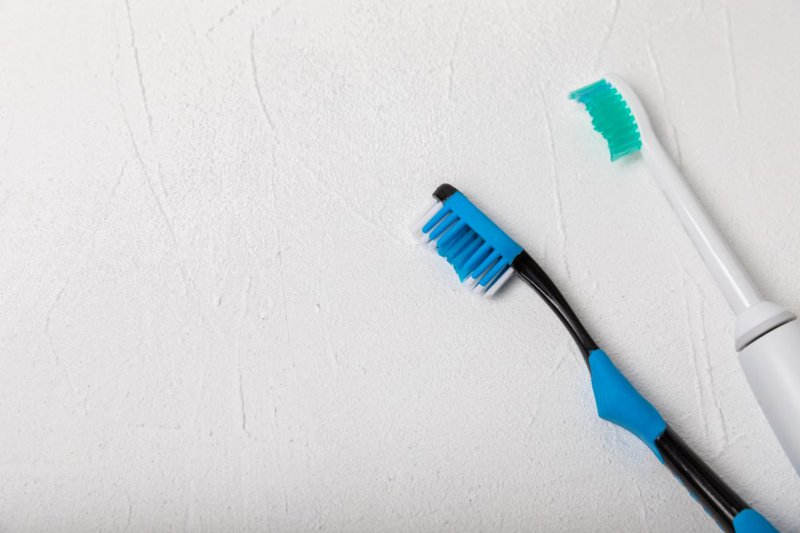
The Pros and Cons of Electric vs. Manual Toothbrushes
When it comes to taking care of your smile, choosing the right toothbrush matters more than you might think. Many patients ask, are electric toothbrushes better than manual ones? It's a fair question—one that sparks plenty of discussion in dental care and daily hygiene routines.
Both types have their strengths and drawbacks, and the right choice often depends on your personal habits, health needs, and preferences. Understanding the difference between a manual toothbrush vs electric one can help you brush more effectively and improve your overall oral hygiene.
This guide will walk you through the electric toothbrush vs manual debate, exploring features, pros, and cons, so you can make the best decision for your oral health and lifestyle.
Overview: Electric vs. Manual Toothbrushes
- To start, here’s a basic comparison of manual vs electric toothbrush options:
- Electric toothbrushes use battery power or rechargeable motors to move the bristles, making it easier to clean your teeth with minimal effort.
- Manual toothbrushes depend entirely on your brushing technique and hand motion to be effective.
- Each type has its advantages, and the right choice often depends on your individual needs and lifestyle. For example:
- Electric models are great for people with arthritis, limited hand mobility, or those who prefer built-in timers and pressure sensors.
- Manual brushes are lightweight, affordable, and ideal for travel or everyday use.
- Understanding the differences in the electric toothbrush vs manual debate can help you make the best oral care decision.

Benefits of Electric Toothbrushes
Electric brushes come packed with smart features that can make daily oral care both more effective and more convenient. Many people are making the switch—and here’s why:
- Ideal for those with limited mobility: These brushes are a great choice for individuals with arthritis, carpal tunnel, or other dexterity-related conditions, as they require less effort to use.
- Better at removing plaque: Research suggests that electric toothbrushes can reduce plaque buildup and gum inflammation more effectively than manual ones over time.
- Advanced technology: Features like built-in timers, pressure sensors, and various cleaning modes help users maintain proper technique and consistency.
- Helps improve technique: If you’re wondering how to brush teeth with an electric toothbrush, most models provide real-time feedback through pulsing or timing features, making proper brushing easier to learn and follow.

Downsides of Electric Toothbrushes
Despite their many benefits, electric toothbrushes aren’t perfect and may not be the best choice for everyone. Here are a few key points to consider:
- Cost: Electric toothbrushes typically have a higher upfront price, and replacement brush heads can add to long-term expenses.
- Charging and battery life: Unlike manual options, these brushes require regular charging or battery replacements, which can be inconvenient.
- Size and portability: Due to their bulkier design, electric toothbrushes are less travel-friendly and may take up more space in your toiletry bag.
Benefits of Manual Toothbrushes
Manual toothbrushes have stood the test of time and remain a popular choice for many people around the world. They offer a simple, effective, and affordable way to maintain good oral hygiene. Here’s why they’re still widely used:
- Affordable: If you’re looking for the best manual toothbrush, there are many high-quality, low-cost options available in drugstores and supermarkets.
- Simple to use: Manual toothbrushes don’t require charging, batteries, or replacement cords—just pick it up and brush.
- Total control: You can adjust the pressure and motion exactly to your liking, which some users find more comfortable than automatic settings.
Whether you're at home or travelling, a manual toothbrush is always ready to use, making it a convenient and dependable option.

Downsides of Manual Toothbrushes
- Of course, manual toothbrushes have their drawbacks too, especially when compared in the manual vs electric toothbrush discussion. While they are simple and accessible, they rely entirely on the user’s technique and effort. Consider the following:
- Proper technique is essential: Without the right brushing method, it’s easy to miss areas, allowing plaque and bacteria to build up.
- No smart features: Unlike electric models, there’s no built-in timer, pressure sensor, or motion guidance to support better brushing habits.
- Harder for some users: People with arthritis, joint pain, or limited dexterity may find manual brushing difficult and tiring.
- For many, especially those needing extra support, the convenience and technology of an electric brush can offer significant advantages over a manual option.
How to Choose the Best Toothbrush for You
Still unsure about the manual toothbrush vs electric comparison? Choosing the right toothbrush comes down to your personal needs, preferences, and oral health goals. Both options have their place, and understanding what works best for you can make a big difference in your daily routine.
Here are a few tips to guide your decision:
- Kids: Electric toothbrushes with bright colours, built-in timers, and interactive features can make brushing more engaging and help establish good habits early on.
- People with braces: Electric toothbrushes are excellent for cleaning around brackets, wires, and other orthodontic appliances more effectively than manual ones.
- Seniors: Battery-powered or rechargeable electric models reduce the strain on hands and wrists, making them a practical choice for those with arthritis or reduced dexterity.
- Travellers or minimalists: Manual toothbrushes are compact, lightweight, and easy to carry, with no need for chargers or batteries—perfect for on-the-go use.
- Budget-minded individuals: Manual toothbrushes are widely available and inexpensive, making them ideal for those looking to save money without sacrificing cleanliness.
Ultimately, your dentist can offer the best advice. Whether you choose a manual or electric model, consistency and technique are key. Ask your dentist which option suits your needs and lifestyle best.
The Best Toothbrush is the One You Use Right!
At the end of the day, is electric toothbrush better than manual? The truth is, there’s no universal answer. The best toothbrush for you is the one you’ll actually use—properly, twice a day, with good technique and consistency. A high-tech brush with all the latest features won’t help if it sits unused, and even the best manual toothbrush won’t be effective without proper brushing habits.
What truly matters is how well you stick to a regular oral care routine. Brushing thoroughly for two minutes, reaching all areas of your mouth, and replacing your toothbrush regularly are all more important than the type of brush you choose.
Whether you prefer the convenience of a smart electric model or the simplicity of a manual brush, both can help maintain a healthy smile. If you’re unsure what’s best for your needs, the team at Maple Ridge Dentistry is always here to help you make the right choice.

